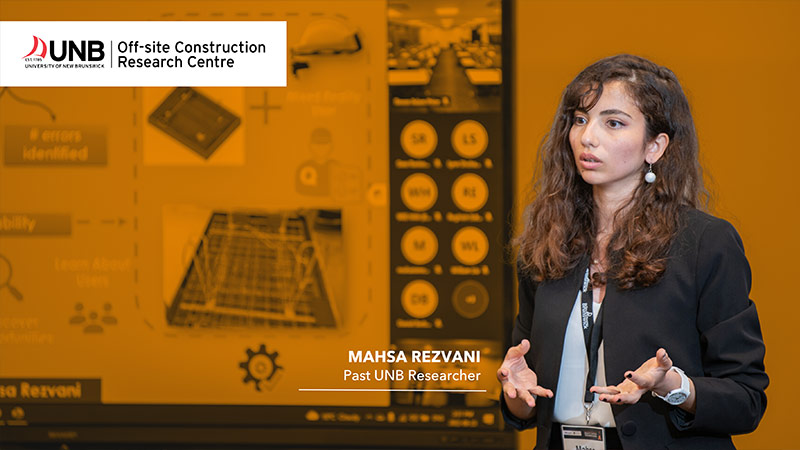UNB OCRC innovator: Mahsa’s journey into cutting-edge construction research and innovation
Author: OCRC
Posted on Feb 14, 2024
Category: Student spotlight

In this blog, Mahsa Rezvani unveils how her journey at the UNB Off-site Construction Research Centre (OCRC) has helped shape her career in construction. Delving into the transformative potential of off-site construction, Mahsa shares valuable advice for both aspiring and experienced professionals in the industry.
What brought you to UNB?
I chose the University of New Brunswick (UNB) for my postgraduate studies in construction engineering due to its diverse programs known for innovation and industry alignment. UNB's research programs, with their focus on cutting-edge developments, stood out to me, reflecting the university's commitment to industry trends. The New Brunswick campuses provide excellent opportunities for professional development in the construction sector, offering a promising environment for growth.
Additionally, UNB's proactive support during the COVID-19 pandemic, demonstrated by their international student advisors, played a crucial role in my decision. Their well-established plans and guidance ensured a smooth transition, reinforcing my confidence in choosing UNB for my postgraduate studies.
What was your research topic?
My research topic is: “Mixed Reality in Precast Concrete Construction: A Case Study of Quality Control Inspection Tasks”.
What interested you in doing research in off-site construction?
My fascination with off-site construction began during my civil engineering studies when my family and I watched documentaries showcasing innovative global construction projects. Witnessing the construction of an entire house in a factory and its subsequent relocation sparked my interest. Recognizing the imminent changes in the construction industry, particularly the rise of off-site construction, I decided to pursue postgraduate studies.
In reaching out to Dr. Jeff Rankin and Dr. Zhen Lei, they recommended exploring the Off-Site Construction Research Centre (OCRC) booklet. Intrigued by emerging technologies like Mixed Reality and Virtual Reality in construction, I found that the OCRC's research areas aligned perfectly with my interests. Enthusiastic about design for manufacturing and assembly, as well as Augmented and Virtual Reality, I aspired to contribute to the OCRC research group.
The supportive and open-minded OCRC team welcomed my ideas to enhance construction efficiency and address industry challenges. Joining OCRC allowed me to see my concepts tested and validated, making it the ideal environment for my involvement in cutting-edge construction research developments.
In your opinion, what are the biggest opportunities coming up in off-site construction? What are the barriers?
I believe in off-site construction for its proven cost-effectiveness and efficiency, addressing weather challenges by assembling modular units off-site. In urban areas, the adaptability of off-site construction, akin to a Lego game, proves highly efficient and cost-saving. While logistical costs pose challenges, I see them as opportunities for research. Exploring the structural integrity of modular units during assembly and disassembly is crucial, offering avenues for further research and development. The industry is advancing toward realizing these innovative ideas.
Tell us a bit about your graduate student experience. What was it like starting out? What were some of the highlights?
My graduate experience at UNB and the Off-site Construction Research Centre (OCRC) was enjoyable, despite the challenges of the COVID-19 era. Supported by UNB and provincial officers, I started my research online with Dr. Jeff Rankin, Dr. Lloyd Waugh, and Dr. Zhen Lei, finding excitement in innovative discussions. Upon meeting the professors in person, I was introduced to Brandon Searle, the Director of Innovations and Operations at OCRC, showcasing mixed reality technology. The challenges and opportunities in research became simultaneously daunting and exciting.
After completing courses in construction engineering and management, I interned with Strescon in 2022, a leading construction group in New Brunswick. The experience was exceptional, with the team's knowledge and openness to innovative solutions.
During my time at Strescon, I explored manufacturing processes and implemented mixed reality technology. Collaborating with OCRC, we addressed market challenges, presenting our research at conferences like CSCE 2022 and the 2022 TCRC conference. Winning the third prize at the 2022 TCRC graduate student design competition highlighted the impactful collaboration between academia and industry. Grateful for Dr. Zhen Lei and Dr. Lloyd Waugh's guidance, I appreciate the opportunities and insights gained in this journey.
What advice would you give new graduate students?
Graduate students often face the challenge of navigating numerous research ideas. While not every idea may yield groundbreaking results, it's vital to choose one, have confidence in it, and learn to effectively present it to both the academic community and the specific audience, such as the construction industry. This advice holds for research in other fields as well. The key is to trust your ideas, consistently study your chosen topic, and master the skill of clear communication to engage your audience effectively.
What are your career aspirations?
In my current role as a Virtual Design and Construction Coordinator, I aspire to introduce the capabilities of construction technologies to various departments involved in the construction processes, with a particular emphasis on on-site teams. Both on-site and off-site construction teams consistently encounter diverse challenges, which can be effectively addressed by leveraging technologies to make processes faster, safer and more efficient. I firmly believe that the necessary technologies already exist, and our task is to identify and understand which ones can bring about the efficiency improvements we seek.
How did your study experience in OCRC help you prepare for a future career in construction?
UNB OCRC's program significantly improved my idea development and presentation skills. Through frequent presentations in classes, I gained valuable experience in job interviews and industry networking. The curriculum highlighted modern construction practices, with the Virtual Design and Construction course focusing on coordinating design and construction teams using Building Information Modelling. Special studies courses, like one on Augmented and Mixed Reality technologies, proved immensely beneficial for refining my research path. Additionally, technology demonstrations honed my ability to explain technology benefits to clients and train others effectively - a crucial skill for implementing new tools in construction, especially with on-site teams.